
Sustainability is one of the four goals in RICS' recently published strategy Future foundations, but Land Journal has already taken up this theme throughout the year in its coverage of issues from lagoon pollution through the future of agriculture to COP28.
But whatever the subject, articles have concentrated on surveyors' skills and the value they can add: whether in contributing to humanitarian missions, dealing with rights of light, or even supporting film production.
Geospatial goes behind the scenes
What aspiring surveyor wouldn't want to get involved with a company that worked on an Oscar-nominated movie?
A May Land Journal article explained how surveyors working on Martin McDonagh's film The Banshees of Inisherin created textured meshes to provide a geometrically accurate representation of the set. These informed, and lent realism to, computer-generated imagery (CGI) in the film.
Although every project may not be quite as exciting as this, Murphy Geospatial saw it as a way to showcase the key skills required for geospatial work, including patience, an eye for detail, respect for the client, and the ability to be flexible.
'Our team is proud to have contributed to an Oscar-nominated film, and delighted to have supported the VFX team in developing their CGI using accurate geospatial data'
Digital mapping offers rural funding opportunities

Closely following the agricultural transition, Land Journal has this year featured various articles about biodiversity net gain (BNG) and details of grants available to rural members. Farmers, landowners and land agents can now access the latest insights using geospatial data, which allows them to see at a glance whether land is eligible for funding.
In a September article, Land App communications lead Tristan O'Leary explained how information is crucial to unlocking the benefits of natural capital, calculating biodiversity credits and working out additionality – that is, the value that land-use changes can add.
'How can we align the competing priorities of the food system and the resilience of agricultural businesses with the imperative for collaborative land management?'
How to pass your APC in rights of light
One important role of the RICS journals is to support APC candidates through their final assessment.
With this in mind, Land Journal published an excellent, practical piece by Dr Peter Defoe in October that set out issues facing candidates wanting to specialise in rights of light, and suggested how they might handle these.
He discussed the level of detail needed for the competencies and what candidates should take into account at all stages of the APC process, offering a thorough examination of the ins and outs of this tricky topic.
'Selecting a case study is fraught with difficulty for rights of light candidates'
Resilience network tackles lagoon pollution

© Sian Davies-Vollum
Climate change and sustainability were the subject of an article about how lagoons and the communities around them are at risk of pollution.
From Ghana to Senegal, natural resources are under pressure. Mangroves and sand, both readily available in those areas, are natural buffers against sea level rise. However, their mismanagement is widespread, resulting in poor water quality. Korle Lagoon in Ghana has for instance become one of the most polluted bodies of water on Earth, with all pollutants from the city of Accra draining into it.
Enter the Resilient Lagoon Network, a collaborative organisation that brings together experts including communities, coastal researchers, government representatives, policymakers and practitioners to understand this problem – and suggests practical ways to resolve it through sustainable, locally led governance.
'The network has developed a policy brief and framework for the sustainable management of lagoons'
Surveyors support response to humanitarian crises
In a March article, charity MapAction reported that the number of natural disasters taking place around the world each year has nearly doubled since the 1980s.
The charity's head of communication Alex Macbeth focused on the devastating earthquake in south-east Türkiye, explaining how its volunteers map the affected landscape and the current situation. It also collaborates with stakeholders and governments to help coordinate the relief efforts using data, and especially data from maps.
The article emphasised how the changing climate is likely to increase the risk of disasters – reminding us of the importance of RICS' attendance at COP28, and its commitment to sustainability.
'There's never been a greater need for the work that MapAction does – but ironically, funding for specialist agencies such as ours is becoming harder to find'
RICS promotes profession at COP28

We couldn't end the year without mentioning COP28, which took place in November and December in the UAE. This was the first time that RICS had official observer status, and delegates from the organisation attended to promote the vital work of members in reducing carbon emissions.
RICS has been advocating sustainability for some time; but no country is working fast enough to ensure global warming is limited to 1.5°C, so this year's conference was particularly significant.
Ahead of the event, RICS head of thought leadership and analysis Tim Smith explained what role the organisation would play in the talks – and how it applies to surveyors' day-to-day work. He outlined the opportunities for surveyors in decarbonising the built and natural environments, and set out how RICS would support and promote its members at the summit.
'If we do our job right, governments and other stakeholders will realise the value of our members'
This small selection of articles represents only a few of the topics featured in the journal this year. To look back into the whole archive, you can search using the 'Browse by specialism' button at the top right of your screen, look for a particular author, or simply scroll down and review the list of articles by date.
Publication resumes in the new year, when we will be covering subjects as varied as the role of surveyors in mapping Antarctica and this year's decision on wild camping in Dartmoor.
